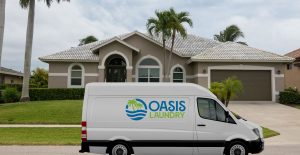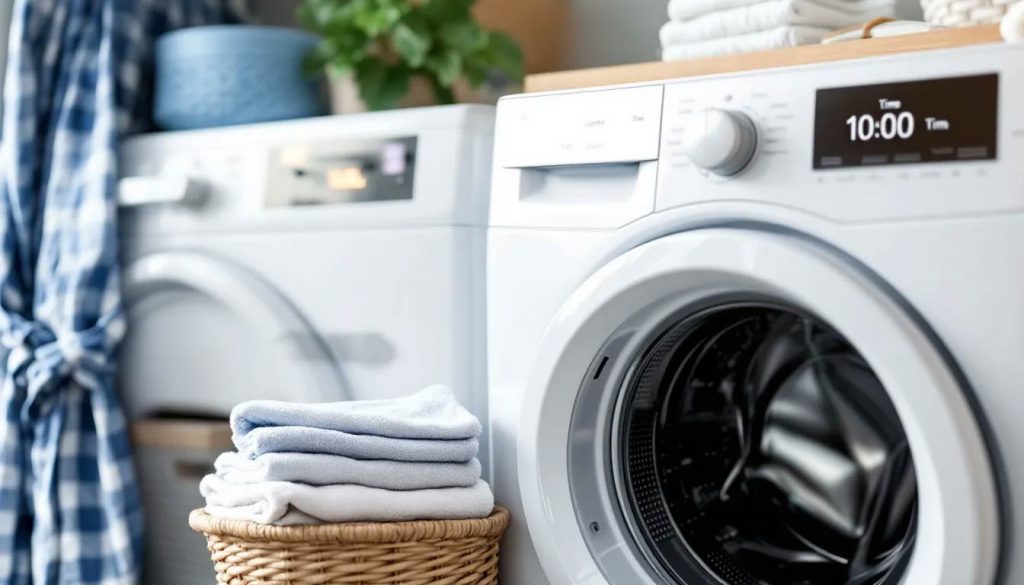Apartment managers face a complex decision when selecting commercial laundry services for apartments. The wrong choice can lead to tenant complaints, equipment failures, and revenue losses.
We at Oasis Laundry understand that property managers need reliable partners who deliver consistent service and maximize building value. This guide covers the essential factors that separate professional laundry providers from basic equipment suppliers.
What Makes a Commercial Laundry Provider Worth Choosing
Geographic Coverage Determines Service Reliability
Location proximity directly impacts service quality and response times. Commercial laundry providers should operate within 50 miles of your property to guarantee 24-48 hour emergency response. Washington Automated serves the northwest (Washington, Oregon, and Idaho), which demonstrates the regional focus necessary for consistent service. National chains often struggle with local responsiveness, while regional providers like Continental Girbau dealers offer better support networks. Service territories matter because equipment breakdowns create significant operational disruptions and lost revenue when machines stay offline.
Equipment Standards Separate Professionals from Amateurs
Commercial-grade equipment must handle 10-15 loads daily without frequent repairs. High-efficiency front-load washers use only 11.2 gallons per load and reduce utility costs by 40% compared to standard top-loaders. Speed Queen and Dexter machines typically last 10-15 years with proper maintenance, while cheaper alternatives fail within 5-7 years. Professional providers offer ENERGY STAR rated equipment that cuts electricity consumption and qualifies for utility rebates. Maintenance response within 24 hours prevents extended downtime that frustrates tenants and reduces property appeal.
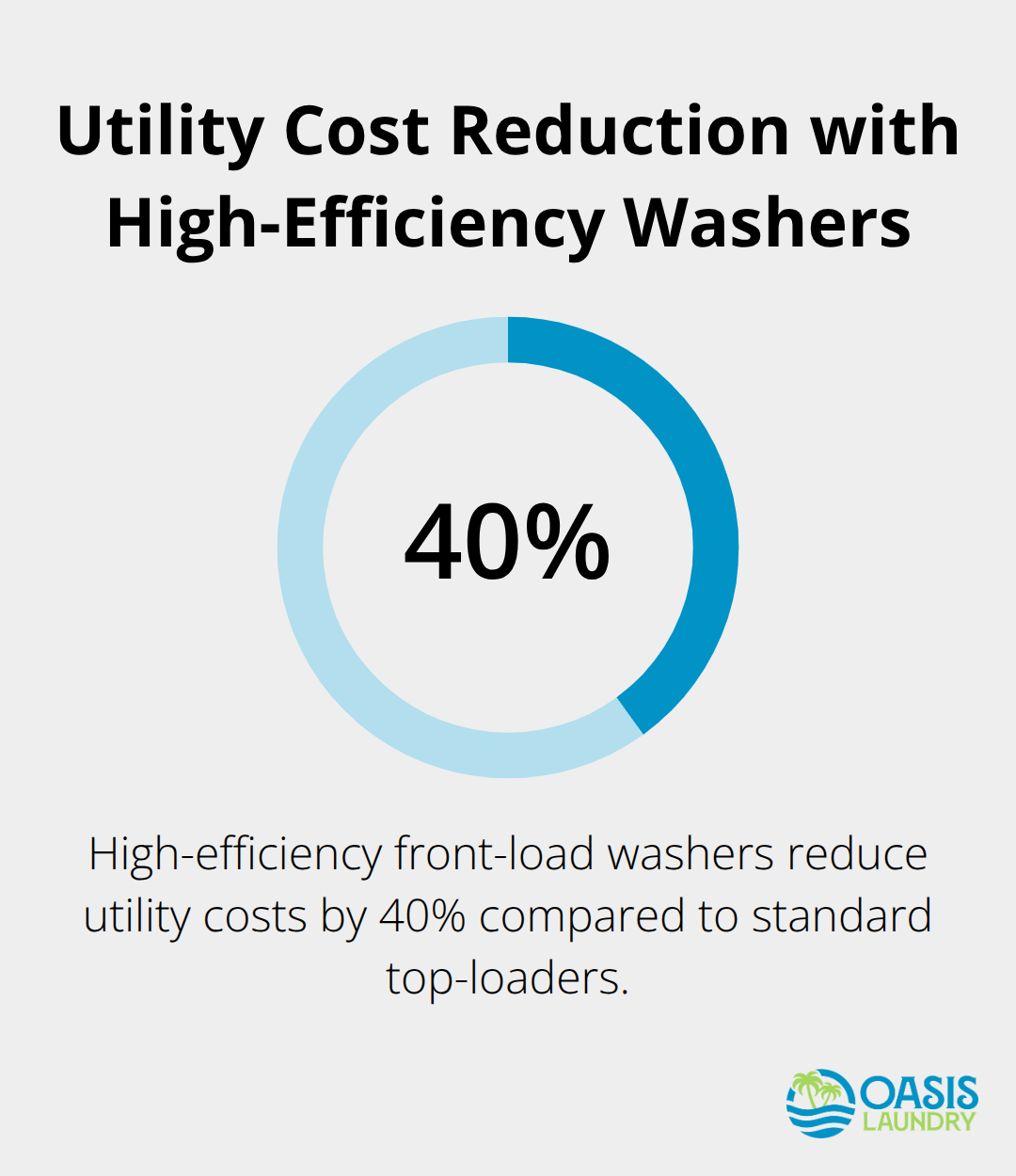
Contract Terms Protect Your Investment
Revenue-share agreements should guarantee property owners receive payments within 30 days, with typical splits from 30-50% of gross revenue. Zero upfront cost programs eliminate initial investments that exceed $2,000 per machine pair. Flexible payment systems (coin, card, and mobile options) accommodate different tenant preferences and increase usage rates. Contract lengths between 5-7 years provide stability while they allow equipment upgrades. Professional providers include comprehensive maintenance, parts replacement, and 24/7 technical support in their agreements, which protects managers from unexpected repair costs that can exceed $500 monthly.
These foundational elements establish the framework for evaluation, but service quality and reliability metrics reveal how providers perform when problems arise.
How Do You Measure Service Quality Before Signing
Emergency Response Separates Reliable Providers from Disappointments
Professional laundry service providers guarantee response times within 24-48 hours for equipment failures, while subpar companies often take 5-7 days to address problems. Washington Automated maintains this standard across the northwest, which demonstrates how regional coverage enables faster service. Machine downtime costs apartment complexes $50-150 daily in lost revenue per unit, which makes rapid response financially critical. Commercial repair services keep your business running with fast repairs, risk reduction, and expert maintenance for all facility needs. Request specific response time commitments in written form and ask for penalty clauses when providers fail to meet deadlines. Companies that hedge on response guarantees typically struggle with service delivery when equipment breaks down.
Staff Expertise Determines Long-Term Success
Certified technicians with manufacturer training prevent 70% of equipment failures through proper maintenance protocols. Continental Girbau and Speed Queen require specialized certification programs that take 40+ hours to complete. Providers who employ uncertified staff create more problems than they solve, which leads to premature equipment replacement and tenant complaints. Ask providers about their technician certification levels and training frequency. Professional companies invest $2,000-5,000 annually per technician in ongoing education. Installation crews should carry proper licensing, bonding, and insurance coverage worth at least $1 million. Providers that cut corners on staff training inevitably create costly problems that property managers inherit.
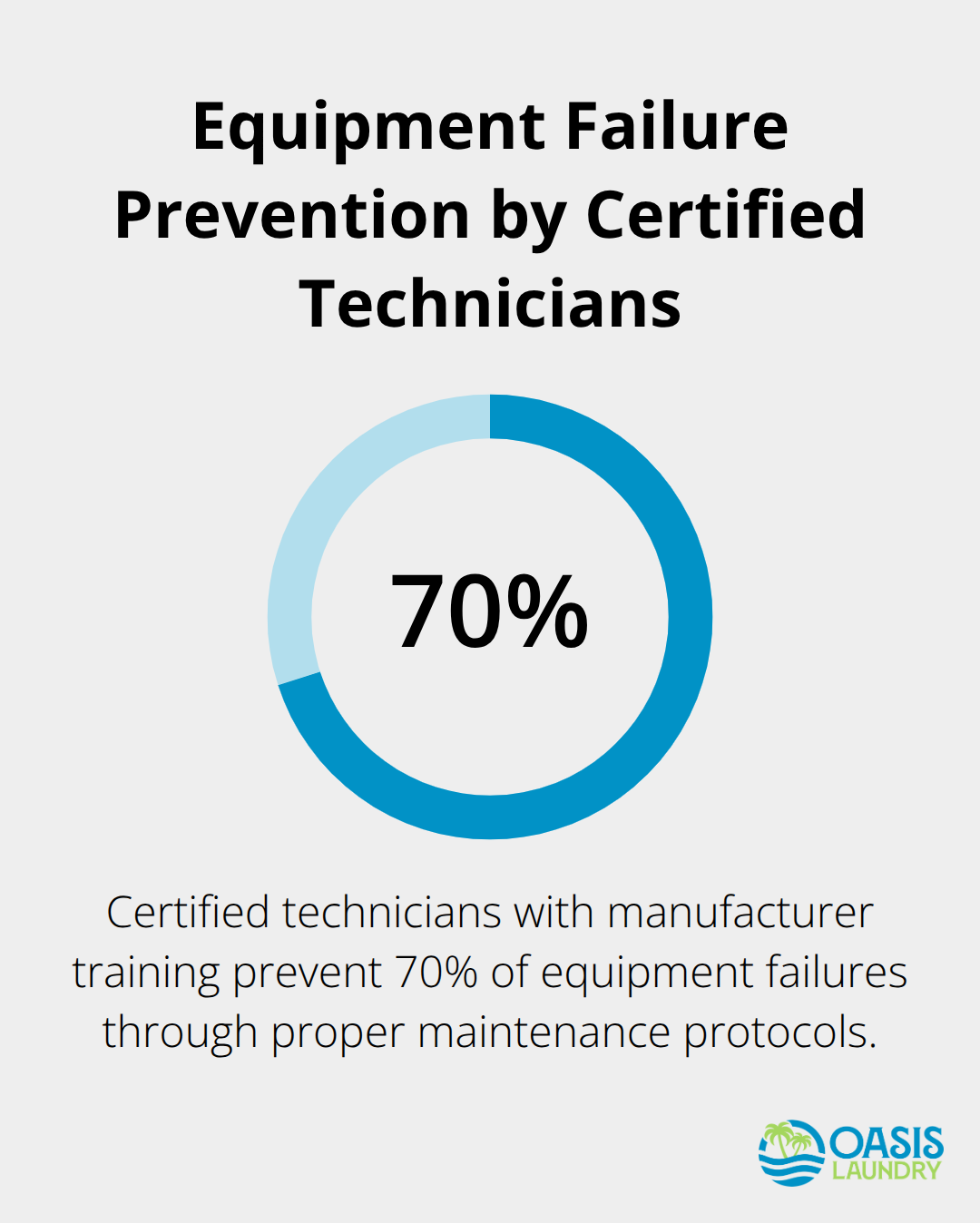
References Reveal True Performance History
Property managers should demand contact information for 5-10 current clients with similar building sizes and tenant demographics. Professional providers readily share references because satisfied customers become their best marketing tools. Contact references directly and ask specific questions about response times, equipment reliability, and revenue consistency. Buildings with 50-100 units provide the most relevant feedback for similar properties. Avoid providers who refuse references or offer only testimonials instead of direct contact information. Companies with strong track records encourage prospective clients to speak with existing customers because positive experiences drive referrals and contract renewals.
Service quality metrics provide the foundation for provider evaluation, but apartment buildings require specific features and services that standard commercial operations cannot deliver effectively.
What Apartment Features Make Laundry Services Work
Modern Communication Systems Drive Tenant Satisfaction
Apartment laundry systems require real-time machine availability tracking and automated notifications that standard commercial setups lack. The Speed Queen Laundry app provides tenants with cycle completion alerts and machine availability status, which reduces wait times and complaints by 60%. Laundroworks payment systems include web-based management portals that allow property managers to monitor usage patterns and revenue in real-time. Tenants expect mobile notifications when their loads finish, especially in buildings with shared laundry rooms. Properties without app-based communication systems experience 40% more tenant complaints about laundry availability and schedule conflicts.
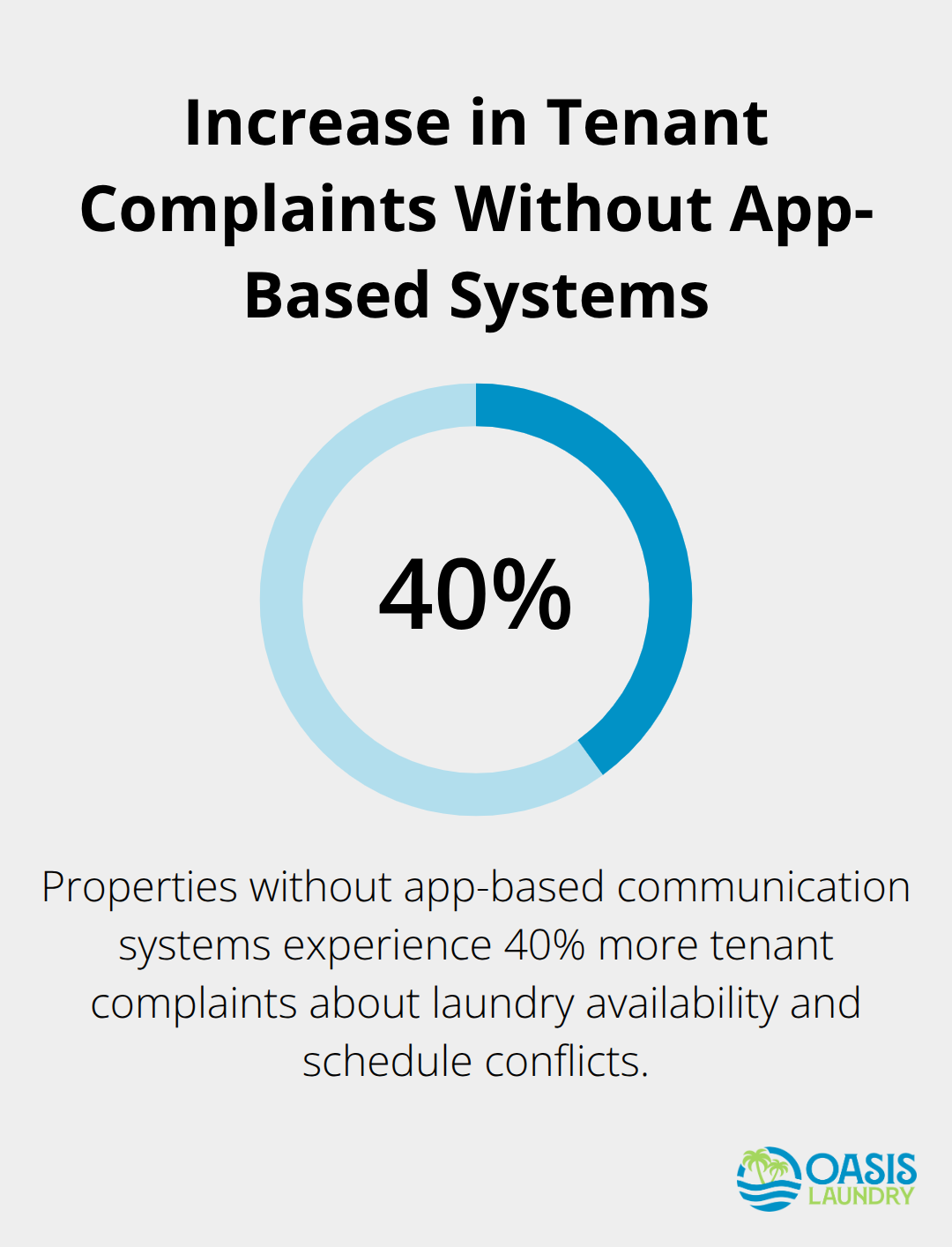
Space Requirements Determine Equipment Performance
Apartment laundry rooms need proper equipment ratios determined by adding all units without in-unit washers and dryers, then dividing by half the units with in-unit laundry to calculate machine requirements. Front-load machines require 6 inches of clearance on all sides for proper ventilation, while top-load units need 12 inches above for lid operation. Professional installation includes dedicated 220V electrical circuits for dryers and proper drainage systems that prevent flood damage. Laundry rooms smaller than 100 square feet create accessibility problems and limit equipment capacity. Installation crews must coordinate with property management to minimize disruption during business hours and complete setup within 2-3 days maximum.
Payment Flexibility Maximizes Revenue Potential
Card and mobile payment systems generate higher usage rates compared to coin-only operations because tenants avoid the inconvenience of collecting quarters. Cashless systems provide property owners with streamlined payments and immediate benefits over traditional coin operations. Revenue-sharing models typically split income 30-50% with property owners, with payments processed within 30 days through electronic transfers. Cashless systems eliminate theft risks that cost coin-operated facilities $200-500 monthly in lost revenue. LaundroPortal management systems track payment trends and identify peak usage times for better resource allocation. Properties that offer multiple payment options (card, mobile app, and coins) accommodate different tenant preferences and maximize machine utilization rates throughout the day.
Final Thoughts
Property managers must evaluate geographic coverage, equipment quality, and contract terms when they select commercial laundry services for apartments. Providers who guarantee 24-48 hour response times, employ certified technicians, and offer flexible payment systems create superior tenant experiences while they maximize revenue potential. Professional partnerships deliver measurable benefits that extend beyond basic equipment installation.
Properties with reliable laundry services experience higher tenant satisfaction rates, reduced maintenance problems, and consistent revenue streams through revenue-sharing agreements. Modern payment systems and mobile apps eliminate common frustrations while they generate usage data that helps optimize operations. These improvements directly impact property value and tenant retention rates.
Property managers should request detailed proposals from regional providers who demonstrate proven track records in similar buildings (compare response guarantees, equipment specifications, and contract terms before final decisions). We at Oasis Laundry offer comprehensive laundry solutions that support both residential and commercial properties. The right commercial laundry provider becomes a valuable long-term partner who enhances property operations through consistent, professional service.
